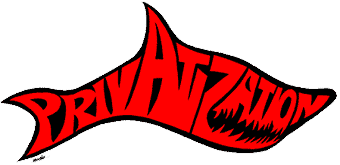
Issues
- Privatization is just another way to cut jobs and pay.
- At least one major study has found privatization means poorer quality services, demoralization, increased discrimination, loss of citizen control, decreased efficiency and higher - not lower - costs.
- Privatization can be fought by combining membership determination with community support.
"Why privatize? we can run it better!"
That's the question members of UE Local 274 and the Office and Professional Employees (OPIU) local at the waste water treatment plant in Montague, Massachusetts asked when their jobs were threatened with privatization. Concerned about the loss of a large industrial customer, the town's Selectmen never thought to ask the people who worked there about what to do.
Instead, they began looking into how to privatize the plant. By summer, four companies were in line with proposals, most of which promised big savings for Montague. Because of intense pressure from the union members, none of the proposals openly called for layoffs or wage cuts (except, perhaps, cuts in management).
Strategies
Tactics to Fight Privatization
- The fight against privatization must be made public and held in public - people are willing to support saving public jobs if they know their money is not being misused;
- Emphasize that privatizing a public service means adding a new, andunacceptable cost: profit. One company, under pressure, admitted taking 10% of the budgets of all the facilities they privatized. Keep in mind, people support public facilities that they think are run well. What they don't like is overpaid bureaucrats and waste;
- Develop a union proposal on how money can be saved and efficiency improved - without cutting jobs or pay. Plenty of help is available to do this. In Montague, workers consulted everyone from the electric company to the federal government - and got valuable advice;
- Look to the community for help. Churches and activists can provide valuable assistance;
- It may be okay to talk about eliminating or trimming executive salaries, the wages, benefits and jobs of workers cannot be put on the table.
IN THE SPOTLIGHT
At a public hearing attended by the affected workers and aired live on local cable, the union members disputed the ability of private companies to run the plant cheaper or better. The Selectmen were challenged to let UE and OPIU members put together their own plan - and, caught in the public spotlight, were left with little choice but to agree.
THE UNION PLAN
For the next several weeks, the union members worked on their proposal. The only guideline: no wage, benefit or job cuts. The workers voted to exclude management from the planning sessions because the plant manager was the person who had first proposed privatization.
The result: a detailed report calling for higher utilization and earnings by processing waste from other communities; process and machine changes that would save on the cost of maintenance, electricity and chemicals; and additional changes that would allow efficient use of the facility.
'LET'S TRY IT'
The workers' plan was, of course, challenged by privatization supporters at another televised hearing. The evidence, however, was overwhelming that the union members had developed a solid, cost-saving plan. A fatal blow to the pro-privatization forces was that they could not (or would not) reveal how much profit the private companies expected to make. In the end, one Selectman's plea that "everyone knows big business runs things better" was greeted with chuckles, derision and a vote to keep the plant public.
Five Myths About Privatization
- Governments are broke because public services and tax dollars have been mismanaged.
Corporate taxes dropped from 23% of federal revenues in 1960 to 9% in 2003. The Bush Administration pushed through $1.2 trillion in tax cuts. Hmm. How come the government is broke?
- Government spending is full of incompetence, waste and fraud.
There are many examples of mismanagement, waste, and dishonesty in corporate America (remember the Savings and Loan fiasco?). More importantly, while there are examples of government overspending, the available evidence clearly suggests the public sector has a long way to go before it catches up to the private sector in the misuse of funds.
- The private sector delivers services at higher-quality and lower cost because of competition.
Aside from the fact that "market forces" have destroyed millions of good-paying jobs, devastated our cities, and driven down our standard of living, simple logic should tell us that it's impossible for the private sector to deliver the same service for less and make a profit at the same time!
- Bad public employees can't be fired, so they don't care about their jobs.
The assumption that public workers are bad workers is just plain wrong. Every day we hear stories of ordinary public servants doing their jobs effectively and under great stress (fire fighters, police, rescue squads, medical personnel, and social workers - to name just a few). And as every union member knows, if the boss has just cause, "bad workers" can be fired.
- All the studies show that privatization is better.
First, many so-called "studies" have been paid for by the private sector - so their "conclusions" aren't surprising. Second, there have been many failures involving privatization - ranging from the delivery of substandard goods and services to outright fraud. One Cornell University study concluded: "we found privatization to be, at best, a disruptive ... and ultimately harmful method of cost saving. At worst, it can actually increase costs, lower the quality of services, reduce public accountability and democratic involvement. ... The rational solution is to ... improve the utilization of the existing workforce ... (through) dialog, discussion, and negotiations."
(Adapted from a White Paper by Ellen J. Dannin, Wayne State University Law School)
